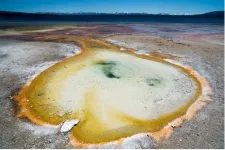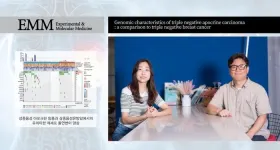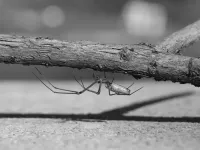(Press-News.org) Oak Ridge National Laboratory scientists studied hot springs on different continents and found similarities in how some microbes adapted despite their geographic diversity. The findings yield clues to the evolution of life and whether some of the hardiest microbes may be harnessed for biotechnology.
The study was the first of its kind to sample hot springs on three continents with water temperatures above 65 C (149 F) in the United States, Iceland and Japan. The environments have unique geology and chemistry, almost like a fingerprint, so it was surprising to find highly related microbes separated by thousands of miles, said ORNL’s Mircea Podar, co-lead of the study with researchers at Montana State University.
“We found common microbes, but also diversity as the microorganisms adapted to local conditions,” Podar said. The scientists theorize that tectonic conditions and geology of the hot springs are at play, providing new insights into how life and the Earth have co-evolved. —Stephanie Seay
END
Life in boiling water
Scientists find evolutionary clues while examining microbes in far-flung hot springs
2023-09-13
ELSE PRESS RELEASES FROM THIS DATE:
100-year floods could occur yearly by end of 21st century
2023-09-13
WASHINGTON — Most coastal communities will encounter 100-year floods annually by the end of the century, even under a moderate scenario where carbon dioxide emissions peak by 2040, a new study finds. And as early as 2050, regions worldwide could experience 100-year floods every nine to fifteen years on average.
A 100-year flood is an extreme water level that has a 1% chance of being exceeded in any given year and is based on historical data. Despite the name, 100-year floods can strike the same area multiple years in a row or not at all within a century. But a new study finds that those historical trends will no ...
How education, work and motherhood shape women’s life ‘pathways’
2023-09-13
A new study from North Carolina State University and Duke University offers insights into the ways that education, work and motherhood shape the lives of women in the United States. In a longitudinal study of more than 8,100 women, the researchers found seven “pathways” that illustrate the way major life events can have long-term ripple effects.
“Our goal here was to examine how family, work and education influence each other in the lives of women, rather than viewing education as a separate process from work and family,” says Anna Manzoni, co-author of a paper on the study and an associate professor of sociology ...
Matter comprises of 31% of the total amount of matter and energy in the universe
2023-09-13
“Cosmologists believe that only about 20% of the total matter is made of regular or ‘baryonic’ matter, which includes stars, galaxies, atoms, and life,” explains first author Dr. Mohamed Abdullah, a researcher at the National Research Institute of Astronomy and Geophysics-Egypt, Chiba University, Japan. “About 80% is made of dark matter, whose mysterious nature is not yet known but may consist of some as-yet-undiscovered subatomic particles.” (Fig. 1)
“The team used a well-proven technique to determine the total amount of matter in the universe, ...
Emily Rogalski joins UChicago to lead new center for healthy brain aging, Alzheimer's and related diseases
2023-09-13
The University of Chicago will launch a pioneering new center aimed at shifting the popular narrative around the physical and cognitive impacts of aging.
Headed by leading neuroscientist Emily Rogalski, PhD, the new University of Chicago Healthy Aging & Alzheimer's Research Care (HAARC) Center will focus on building deep multidisciplinary expertise and bridging the gap between scientific disciplines to accelerate breakthroughs in cognitive resilience.
“We want to increase awareness and the scientific probability ...
Illuminating the path to sustainable wellbeing
2023-09-13
IIASA is proud to announce the launch of its Flagship Report, "Systems Analysis for Sustainable Wellbeing. 50 Years of IIASA Research, 40 Years After the Brundtland Commission, Contributing to the Post-2030 Global Agenda” on Wednesday, 13 September 2023 at an official UN event in the framework of the 78th session of the UN General Assembly and the Sustainable Development Goals mid-term review.
The IIASA Flagship Report chronicles the extraordinary 50-year journey of IIASA, a globally renowned institute providing systems analytical expertise on complex global challenges. Co-sponsored by the Permanent Missions of Austria and South Africa ...
Study finds that state-mandated civics test policy does not improve youth voter turnout
2023-09-13
Washington, September 13, 2023—The United States has the largest age gap in voter turnout among advanced democracies. Youth voter turnout remained low, at 48 percent, in 2020. Scholars, educators, and policymakers often recommend civic education as a solution to low youth voter turnout.
However, new research finds that a commonly used state-mandated civics test policy—the Civics Education Initiative (CEI)—does not improve youth voter turnout, at least in the short term. The study, by Jilli Jung and Maithreyi Gopalan, both at Pennsylvania State University, was published today in Educational ...
Groundbreaking research unveils genetic characteristics and improved prognosis of triple negative apocrine carcinoma
2023-09-13
Breast cancer research takes a significant stride forward as Professor Semin Lee and his research team from the Department of Biomedical Engineering at UNIST, in collaboration with Professor Ji-Yeon Kim and Professor Young-Hyuck Im from the Division of Hematology-Oncology at Samsung Medical Center in Seoul, delves into the exploration of triple negative apocrine carcinoma. This rare breast cancer subtype has garnered attention due to its unique genetic characteristics and improved prognosis when compared to other forms of triple-negative breast cancer (TNBC).
Triple negative ...
Inflammatory signs for adolescent depression differ between boys and girls
2023-09-13
New research led by the Institute of Psychiatry, Psychology & Neuroscience (IoPPN) at King’s College London has found that depression and the risk of depression are linked to different inflammatory proteins in boys and girls.
When inflammation occurs in the body a host of proteins are released into the blood called cytokines. Previous research has shown that higher levels of cytokines are associated with depression in adults, but little is known about this relationship in adolescence.
Researchers investigated sex-differences in the relationship between inflammatory proteins and depression. Published in the Journal of ...
The effect of crowdsourcing contests on a company's stock and the idiosyncratic risks they create for investors
2023-09-13
Researchers from University of Colorado Denver, Iowa State University, and Arizona State University published a new Journal of Marketing study that examines the stock market effects on these contests and the contest characteristics that may enable such contests to pay off.
The study, forthcoming in the Journal of Marketing, is titled “When Do Marketing Ideation Crowdsourcing Contests Create Shareholder Value? The Effect of Contest Design and Marketing Resource Factors” and is authored by Zixia Cao, Hui Feng, and Michael A. Wiles.
Crowdsourcing contests for marketing ideas such as new ads, graphics, and products have become quite popular ...
Some spiders can transfer mercury contamination to land animals, study shows
2023-09-13
Sitting calmly in their webs, many spiders wait for prey to come to them. Arachnids along lakes and rivers eat aquatic insects, such as dragonflies. But, when these insects live in mercury-contaminated waterways, they can pass the metal along to the spiders that feed on them. Now, researchers reporting in ACS’ Environmental Science & Technology Letters have demonstrated how some shoreline spiders can move mercury contamination from riverbeds up the food chain to land animals.
Most mercury that enters waterways ...
LAST 30 PRESS RELEASES:
Black soldier fly larvae show promise for safe organic waste removal
People with COPD commonly misuse medications
How periodontitis-linked bacteria accelerate osteoporosis-like bone loss through the gut
Understanding how cells take up and use isolated ‘powerhouses’ to restore energy function
Ten-point plan to deliver climate education unveiled by experts
Team led by UC San Diego researchers selected for prestigious global cancer prize
Study: Reported crop yield gains from breeding may be overstated
Stem cells from human baby teeth show promise for treating cerebral palsy
Chimps’ love for crystals could help us understand our own ancestors’ fascination with these stones
Vaginal estrogen therapy not linked to cancer recurrence in survivors of endometrial cancer
How estrogen helps protect women from high blood pressure
Breaking the efficiency barrier: Researchers propose multi-stage solar system to harness the full spectrum
A new name, a new beginning: Building a green energy future together
From algorithms to atoms: How artificial intelligence is accelerating the discovery of next-generation energy materials
Loneliness linked to fear of embarrassment: teen research
New MOH–NUS Fellowship launched to strengthen everyday ethics in Singapore’s healthcare sector
Sungkyunkwan University researchers develop next-generation transparent electrode without rare metal indium
What's going on inside quantum computers?: New method simplifies process tomography
This ancient plant-eater had a twisted jaw and sideways-facing teeth
Jackdaw chicks listen to adults to learn about predators
Toxic algal bloom has taken a heavy toll on mental health
Beyond silicon: SKKU team presents Indium Selenide roadmap for ultra-low-power AI and quantum computing
Sugar comforts newborn babies during painful procedures
Pollen exposure linked to poorer exam results taken at the end of secondary school
7 hours 18 mins may be optimal sleep length for avoiding type 2 diabetes precursor
Around 6 deaths a year linked to clubbing in the UK
Children’s development set back years by Covid lockdowns, study reveals
Four decades of data give unique insight into the Sun’s inner life
Urban trees can absorb more CO₂ than cars emit during summer
Fund for Science and Technology awards $15 million to Scripps Oceanography
[Press-News.org] Life in boiling waterScientists find evolutionary clues while examining microbes in far-flung hot springs




